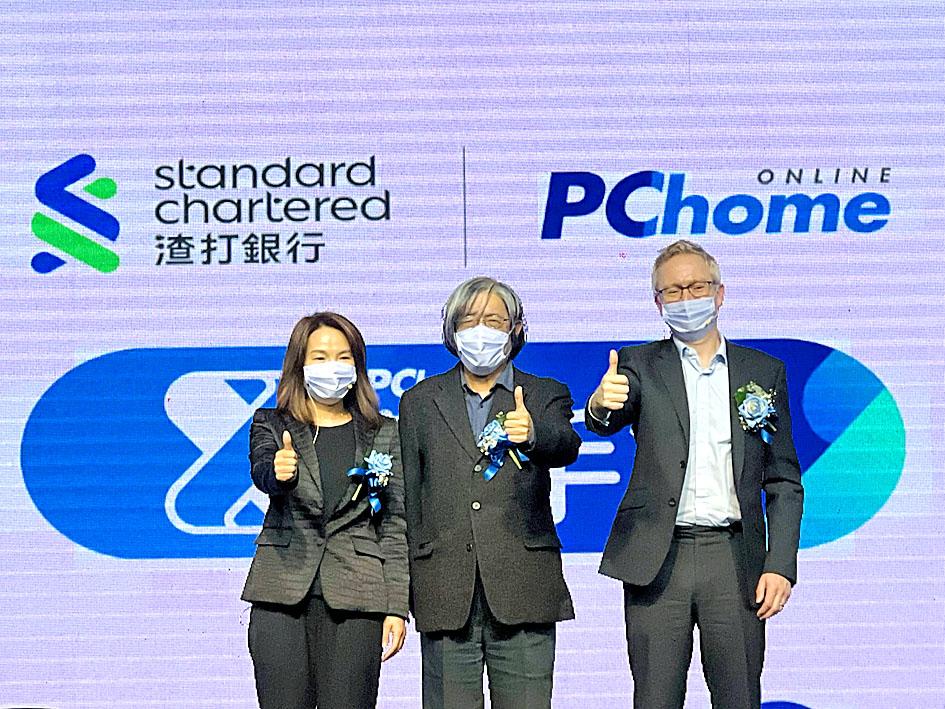Standard Chartered Bank (Taiwan) Ltd (渣打國際商業銀行) yesterday announced that it has partnered with PChome Online Inc (網路家庭) to offer loans to the e-commerce platform’s about 10,000 suppliers to meet their financial needs.
The collaboration came as a surprise in light of PChome’s cooperation with Citibank Taiwan Ltd (花旗台灣) and E.Sun Commercial Bank (玉山銀行) in issuing co-branded credit cards.
Standard Chartered said that it is not planning to launch a credit card with PChome, as the local credit card market is already intensely competitive, but would rather focus on lending to e-commerce retailers.

Photo: CNA
E-commerce retailers are usually overlooked, as banks prefer their brick-and-mortar counterparts, which have tangible assets, Standard Chartered said.
As such, e-commerce retailers’ financial needs are usually not met, it added.
A survey showed that 62 percent of PChome’s suppliers said that they need more working capital as sales have boomed amid the COVID-19 pandemic.
While 69 percent of respondents said they rely on banks for funding, they said the application process is cumbersome, including having to wait at bank offices, the survey showed.
Standard Chartered said that is why its loan program is an online service: Suppliers can file their applications online, but would need to stamp their company seals on paper in line with regulations.
The bank would dispatch a delivery person to pick up the documents, so applicants need not visit its office, it said.
Standard Chartered said it would be able to offer a revolving credit limit that is more accurate than banks’ traditional offerings, as it would be able to access PChome’s database to check the supplier’s operating performance.
The higher a supplier’s sales are, the higher would be its loan quota, it said, adding that the bank would not access clients’ data unless they apply for a loan.
The process utilizes big data analysis, artificial intelligence and application programming interface, as well as data connection among Standard Chartered Bank, PChome and the Joint Credit Information Center (金融聯合徵信中心), it said.
The lending program would be the first in the nation dedicated to e-commerce retailers, it said.
“This service would not only meet the funding demands of small and medium-sized retailers, but it would also help control credit risks. It is essential for us to build a digital financial ecosystem in Taiwan,” Standard Chartered Taiwan CEO Ian Anderson told reporters.
A preliminary evaluation showed that among all of PChome’s suppliers, 10,000 would be eligible to participate in the program, and the bank expects about 20 percent of them to apply for loans by the end of this year.

MULTIFACETED: A task force has analyzed possible scenarios and created responses to assist domestic industries in dealing with US tariffs, the economics minister said The Executive Yuan is tomorrow to announce countermeasures to US President Donald Trump’s planned reciprocal tariffs, although the details of the plan would not be made public until Monday next week, Minister of Economic Affairs J.W. Kuo (郭智輝) said yesterday. The Cabinet established an economic and trade task force in November last year to deal with US trade and tariff related issues, Kuo told reporters outside the legislature in Taipei. The task force has been analyzing and evaluating all kinds of scenarios to identify suitable responses and determine how best to assist domestic industries in managing the effects of Trump’s tariffs, he

TIGHT-LIPPED: UMC said it had no merger plans at the moment, after Nikkei Asia reported that the firm and GlobalFoundries were considering restarting merger talks United Microelectronics Corp (UMC, 聯電), the world’s No. 4 contract chipmaker, yesterday launched a new US$5 billion 12-inch chip factory in Singapore as part of its latest effort to diversify its manufacturing footprint amid growing geopolitical risks. The new factory, adjacent to UMC’s existing Singapore fab in the Pasir Res Wafer Fab Park, is scheduled to enter volume production next year, utilizing mature 22-nanometer and 28-nanometer process technologies, UMC said in a statement. The company plans to invest US$5 billion during the first phase of the new fab, which would have an installed capacity of 30,000 12-inch wafers per month, it said. The

Taiwan’s official purchasing managers’ index (PMI) last month rose 0.2 percentage points to 54.2, in a second consecutive month of expansion, thanks to front-loading demand intended to avoid potential US tariff hikes, the Chung-Hua Institution for Economic Research (CIER, 中華經濟研究院) said yesterday. While short-term demand appeared robust, uncertainties rose due to US President Donald Trump’s unpredictable trade policy, CIER president Lien Hsien-ming (連賢明) told a news conference in Taipei. Taiwan’s economy this year would be characterized by high-level fluctuations and the volatility would be wilder than most expect, Lien said Demand for electronics, particularly semiconductors, continues to benefit from US technology giants’ effort

‘SWASTICAR’: Tesla CEO Elon Musk’s close association with Donald Trump has prompted opponents to brand him a ‘Nazi’ and resulted in a dramatic drop in sales Demonstrators descended on Tesla Inc dealerships across the US, and in Europe and Canada on Saturday to protest company chief Elon Musk, who has amassed extraordinary power as a top adviser to US President Donald Trump. Waving signs with messages such as “Musk is stealing our money” and “Reclaim our country,” the protests largely took place peacefully following fiery episodes of vandalism on Tesla vehicles, dealerships and other facilities in recent weeks that US officials have denounced as terrorism. Hundreds rallied on Saturday outside the Tesla dealership in Manhattan. Some blasted Musk, the world’s richest man, while others demanded the shuttering of his